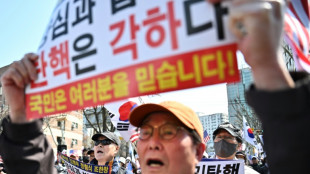

US approves $5.58 bn fighter jet sale to Philippines
The United States said Tuesday it has approved the possible sale of $5.58 billion in F-16 fighter jets to the Philippines, as Washington backs its ally in rising tensions over China.
The State Department said it was green-lighting a sale that includes 20 F-16 jets and related equipment to the Philippines, a treaty-bound ally of the United States.
The sale would "improve the security of a strategic partner that continues to be an important force for political stability, peace and economic progress in Southeast Asia," a State Department statement said.
It would also boost "the Philippine Air Force's ability to conduct maritime domain awareness" and "enhance its suppression of enemy air defenses," the statement said.
The news follows months of increasing confrontations between the Philippines and China in the South China Sea, which Beijing claims almost in its entirety despite an international ruling that its assertion has no merit.
A State Department spokesperson said Wednesday that the deal would be final only after "a signed Letter of Offer and Acceptance" was received from the "purchasing partner".
Philippine defense department spokesman Arsenio Andolong told AFP he had "not received any official notice of such a decision."
But China warned Manila against the purchase, saying the Philippines was "threatening" regional peace.
"The Philippines' defense and security cooperation with other countries should not target any third party or harm the interests of a third party. Nor should it threaten regional peace and security or exacerbate regional tensions," foreign ministry spokesman Guo Jiakun said.
Manila and Washington have deepened their defense cooperation since President Ferdinand Marcos took office in 2022 and began pushing back on Beijing's sweeping South China Sea claims.
In December, the Philippines angered China when it said it planned to acquire the US mid-range Typhon missile system in a push to secure its maritime interests.
Beijing warned such a purchase could spark a regional "arms race".
- 'Inevitably' involved -
President Donald Trump's administration has sought to redirect US military efforts to Asia to face a rising China, especially as tensions rise over Taiwan, and to lessen involvement in Europe despite Russia's invasion of Ukraine.
On Tuesday, as Chinese ships and warplanes surrounded Taiwan in a simulated blockade, Philippines military chief General Romeo Brawner said his country would "inevitably" be involved should the self-ruled island be invaded.
"Start planning for actions in case there is an invasion of Taiwan," he told troops in northern Luzon island, without naming the potential invader.
"Because if something happens to Taiwan, inevitably we will be involved."
He also said that the bulk of this month's joint military exercises would be conducted in northern Luzon, the part of the Philippines nearest Taiwan.
"These are the areas where we perceive the possibility of an attack. I do not want to sound alarmist, but we have to prepare," he added.
Asked about Brawner's comments, Beijing foreign ministry spokesman Guo said resolving "the Taiwan issue is a matter for the Chinese people."
"We advise certain individuals in the Philippines not to play with fire or make provocations on the Taiwan issue -- those who play with fire will only get burned," he said.
On a visit to Manila last week, Defense Secretary Pete Hegseth vowed to "reestablish deterrence in the Indo-Pacific region" in light of "threats from the Communist Chinese."
Secretary of State Marco Rubio has also reiterated US defense commitments to the Philippines, a contrast to the Trump administration's frequent talk of "freeloading" off the United States by allies in Europe.
O.F.MacGillivray--NG



